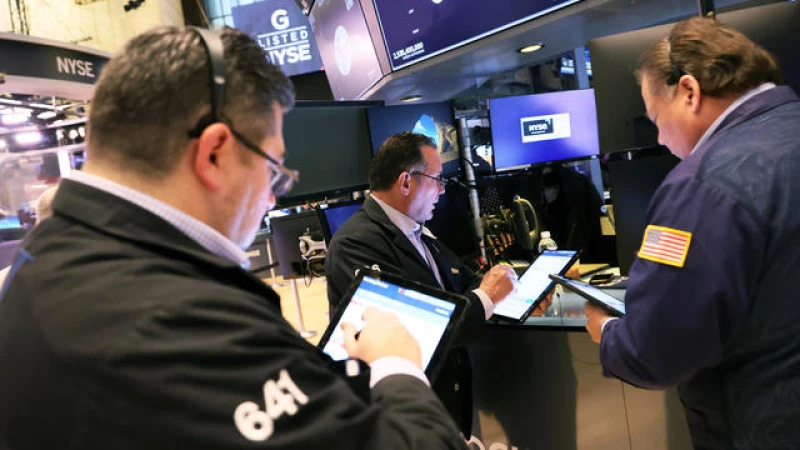As new inflation data emerges, U.S. stocks are taking a hit on Wednesday. The S&P 500 is down 1.1% in early trading, marking one of its worst days of the year. Meanwhile, the Dow Jones Industrial Average has dropped 451 points, or 1.2%, as of 9:35 a.m. EST, and the Nasdaq composite is 1.1% lower.
"There are still embers of inflation here and there in the economy," noted Joe Davis, chief global economist at Vanguard.
For consumers, the implications are clear - the potential for even higher prices at the store. However, for Wall Street, the concern lies in the Federal Reserve potentially holding back on interest rate cuts that traders have been anticipating and banking on.
The S&P 500 Soars Over 20% Since Halloween
Since Halloween, the S&P 500 has seen a remarkable surge of over 20%. This surge is largely attributed to the anticipation of the Federal Reserve lowering its benchmark interest rate, which currently stands at its highest level in more than two decades. The expected rate cuts are anticipated to ease economic pressure and boost investor confidence, leading to higher prices for various investments including stocks, bonds, cryptocurrencies, and more.
Following the morning release of CPI data, a downward trend was observed across various investment classes such as bonds, bitcoin, and gold. The drop was linked to the significant increase in gasoline prices and rent, which accounted for more than half of the monthly rise as reported by the government here.
Investors Adjust Expectations as Fed Rate Cut Possibility Dwindles
Market sentiment has shifted as investors now see only a 25% chance of the Fed cutting rates in June, a significant drop from the previous 74% probability. This change reflects a more cautious approach to the economic outlook.
Traders have also redirected their focus towards the possibility of the Fed implementing two rate cuts throughout the year, a stark contrast to initial forecasts of six or more cuts by 2024. This shift in expectations has prompted discussions about the potential for future rate hikes.
Rising Interest Rates and Economic Concerns
The adjustment in market expectations comes amidst concerns about the impact of high interest rates on inflation and economic growth. Critics have highlighted overvaluation in the stock market, emphasizing the need for either lower interest rates or improved company profits to sustain current stock prices.
While some analysts view the recent Consumer Price Index (CPI) data as a sign of a challenging road ahead, others remain cautious about interpreting it as a definitive trend. The uncertainty surrounding future rate decisions underscores the complex economic landscape that investors are navigating.
"In a recent communication, it was stated that all the drivers of the post-COVID inflation surge are now moving in the right direction," a source mentioned. "Although the journey ahead may have its bumps, any short-term setbacks should be viewed within the context of the overall positive outlook."
Additionally, an EY senior economist, Lydia Boussour, is of the opinion that CPI figures are poised to decrease soon.
"The current inflation trends suggest a stabilization in the disinflation process, with expectations of a renewed downward trend in the upcoming months," the economist shared in a recent report. "While there is a forecast for the Federal Reserve to initiate an easing cycle in June and execute three rate cuts this year, the latest data might lead a slight majority of policymakers to revise their expectations for fewer rate cuts in 2024 and a delayed start to the easing cycle."
Contrary to this viewpoint, some analysts remain highly skeptical about the possibility of imminent rate cuts, and their skepticism may be justified. Chair Jerome Powell and other officials, including Loretta Mester, the president of the Cleveland Fed, have emphasized that the primary consideration for the Fed's decision on rate cuts hinges on when — or if — inflation will revert back to the central bank's 2% target.
"Forget about a June interest rate cut," stated Greg McBride, chief financial analyst at Bankrate, in a research note. "Inflation has exceeded expectations, the lack of progress towards 2% is becoming a pattern, and with oil prices recently hitting a 5-month peak, the headline Consumer Price Index has actually increased more rapidly over the past year compared to February."
McBride perceives the most recent inflation data as a warning sign. "There is no sign of improvement here, we are heading in the wrong direction," he remarked.
Delta Air Lines and banking earnings
Delta Air Lines reported a strong demand for flights globally, with expectations for this strength to persist through the spring. Consequently, its stock surged by 3.4%, leading to a rise in other airline stocks as well.
The sectors on Wall Street that experienced the most significant losses included real-estate investment trusts, utility companies, and other stocks that are typically impacted the most by high interest rates. Real-estate stocks in the S&P 500 recorded a 3% decline, marking the largest loss among the 11 sectors comprising the index.
Stock markets abroad experienced mixed results today. While indexes fell across much of Europe, Asian trading saw a different trend. Stocks in Hong Kong rose by 1.9%, indicating a positive market sentiment. However, in Shanghai, stocks fell by 0.7% following Fitch Ratings' decision to lower its outlook for China's public finances.







